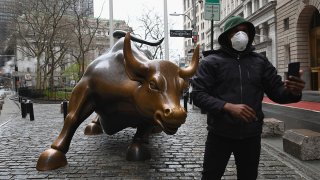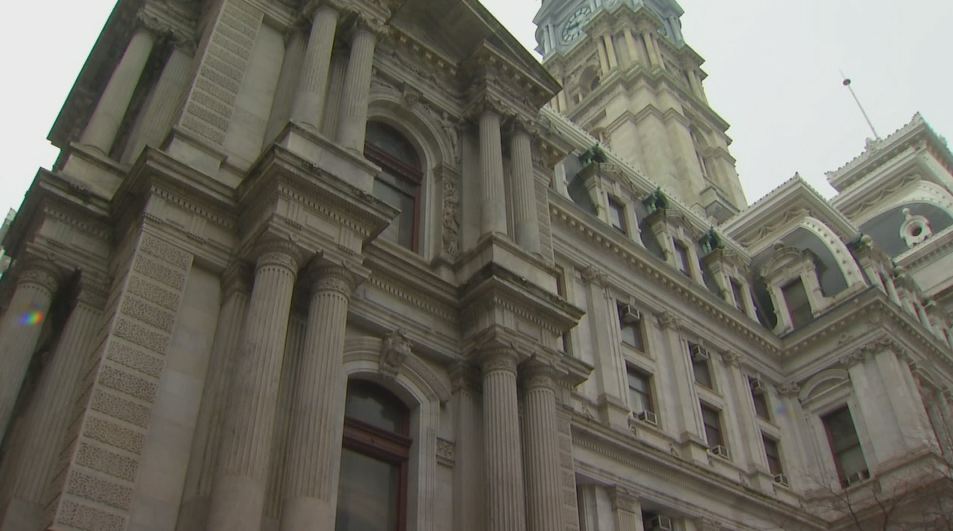
Shares fell in Asia on Wednesday after Wall Street logged its biggest loss since the start of the month on worries about the downside of reopening the economy too soon.
Benchmarks slid in Tokyo, Shanghai and Hong Kong but rose in Taiwan.
The top U.S. infectious diseases expert, Dr. Anthony Fauci, told Congress bluntly that if the country reopens too soon, it could not only cause “some suffering and death that could be avoided, but could even set you back on the road to try to get economic recovery.”
The S&P 500 dropped 2.1% to 2,870.12 on Tuesday after spending much of the day drifting between small gains and losses, as investors debated whether the lifting of lockdowns across U.S. states and the world will drive an economic rebound or just more coronavirus infections.
Get Philly local news, weather forecasts, sports and entertainment stories to your inbox. Sign up for NBC Philadelphia newsletters.
The Dow Jones Industrial Average fell 1.9% to 23,764.78, and the Nasdaq composite lost 2.1%, to 9,002.55.
Smaller stocks also fell more than the rest of the market, as they usually do when worries are on the rise. The Russell 2000 index of small-cap stocks lost 45.70, or 3.5%, to 1,275.54.
Losses accelerated in the last hour of trading, with stocks of companies whose profits are most closely tied to the strength of the economy posting some of the sharpest drops. Treasury yields also fell in a sign of increased caution.
Health
In Asia, Tokyo's Nikkei 225 index lost 0.7% to 20,226.67 while the Hang Seng in Hong Kong edged 0.1% lower to 24,221.41.
The Shanghai Composite index fell 0.2% to 2,886.22 and South Korea's Kospi shed 0.1% to 1,920.87.
Australia's S&P ASX 200 skidded 0.6% to 5,368.20, while shares in Taiwan inched higher.
Governments around the world and in some U.S. states have already begun gradually lifting restrictions intended to slow the spread of the coronavirus outbreak that have caused a steep economic downturn. Expectations that growth will resume following the reopenings have helped drive the S&P 500 up 28% since late March.
But South Korea and other countries further ahead in removing restrictions have also seen small but notable increases in infections recently, adding to worries about possible future waves of infections.
“What we’re dealing with, both today and the last couple of weeks, is the optimism behind the reopening and asking: Are we going to be reopening too soon?” said Bill Northey, senior investment director at U.S. Bank Wealth Management.
”We’re in an unknowable scenario at this point in time,” he said.
The market will essentially be in wait-and-see mode for the next two to four weeks as investors gauge how the reopenings underway in several states are going, said Sal Bruno, chief investment officer at IndexIQ.
“It all stems from the number of new cases and the number of reported cases,” he said. “If we slow that to a trickle, that’s going to be hugely positive for the market because it will give people more confidence that the unemployment rate will go down quicker.”
After dropping by roughly a third from February into late March on worries about the coming recession, the S&P 500 began recovering after the Federal Reserve and Capitol Hill flooded the economy with trillions of dollars in aid. The latest implementation of that came Tuesday, when the New York Fed began buying funds to support the corporate bond market.
With all that unprecedented support in place, markets are now focusing much more on when the economy can resume growing and less on reports coming in daily that show how badly the economy has been hurt by the pandemic. Inflation in the United States was just 0.3% last month from a year earlier, for example, but the report had limited effect on markets.
Treasurys were some of the first investments to signal the economic devastation coming from the pandemic. The yield on the 10-year Treasury was steady at 0.66%, down from 0.72% late Monday. It tends to fall when investors are downgrading their expectations for the economy and inflation.
A barrel of U.S. oil to be delivered in June fell 28 cents to $26.05 per barrel in electronic trading on the New York Mercantile Exchange. On Tuesday, it gained $1.25 to $26.33. Brent crude, the international standard, gave up 49 cents to $29.40 per barrel.
The dollar was trading at 107.20 Japanese yen, up from 107.13 late Tuesday. The euro strengthened to $1.0851 from $1.0848.
___
AP Business Writer Elaine Kurtenbach contributed.



